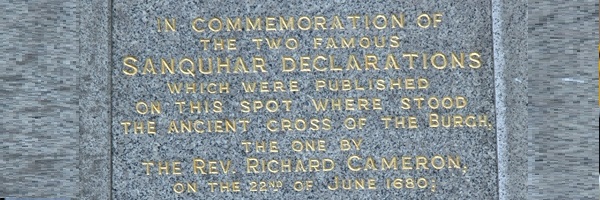   |
|
|
|
|
| ||||||

On 22nd June 1679, the Battle of Bothwell Bridge was foughtThe Battle of Bothwell Bridge, or Bothwell Brig' was fought between government troops and militant Presbyterian Covenanters, and signalled the end of their brief rebellion.The Battle of Bothwell Bridge is significant as it brings to an end the 1679 Covenanter rebellion. This was the largest of the Covenanter uprisings of the 17th century and features many figures who were prominent in Scottish political and military history in the latter part of the century. It is also final major battle between the Covenanters and their Government opponents.Read More

The Sanquhar DeclarationThe Sanquhar Declaration was a speech read 22nd June 1680 by Michael Cameron in the presence of his brother, the Covenanter leader Richard Cameron, accompanied by twenty armed men in the public square of Sanquhar, Scotland, in 1680, disavowing allegiance to Charles II and the government of Scotland, in the name of "true Protestant and Presbyterian interest", opposition to government interference in religious affairs. 
Birth of John Henry Douglas MPPOn this day in 1851, John Henry Douglas MPP was born. He was a farmer and politician in Ontario, Canada. He represented Northumberland East in the Legislative Assembly of Ontario from 1898 to 1902 as a Liberal. The image, The Fathers of Confederation by Frederick S. Challener, is illustrative 
Rev. Thomas Douglas lived in dangerous timesThomas Douglas of Stanypath, minister of Balmerino in 1578, Was assaulted coming from his church on Sunday 10th May 1584, to the loss of blood, by John Forrest, brother to the laird of that Ilk; and was nearly assassinated on 22nd June 1603 in Edinburgh by Walter Grahane, who struck him 'twa straikis upone the heid begind the right lug' to the effusion of blood in great quantity. His assailant was sentenced to be 'securit fra the Castel hill to the Nether Bow, and his richt hand to be strcken af at the Nether Bow' and to be banished. BirthsDonec id elit non mi porta gravida at eget metus. Fusce dapibus, tellus ac cursus commodo, tortor mauris condimentum nibh, ut fermentum massa justo sit amet risus. Etiam porta sem malesuada magna mollis euismod. Donec sed odio dui. DeathsDonec id elit non mi porta gravida at eget metus. Fusce dapibus, tellus ac cursus commodo, tortor mauris condimentum nibh, ut fermentum massa justo sit amet risus. Etiam porta sem malesuada magna mollis euismod. Donec sed odio dui. Events
217 BC – Battle of Raphia: Ptolemy IV Philopator of Egypt
defeats Antiochus III the Great of the Seleucid kingdom. | ||||||
|
The content of this website is a collection of materials gathered from a variety of sources, some of it unedited. The webmaster does not intend to claim authorship, but gives credit to the originators for their work. As work progresses, some of the content may be re-written and presented in a unique format, to which we would then be able to claim ownership. Discussion and contributions from those more knowledgeable is welcome. Last modified: Friday, 02 August 2024 |